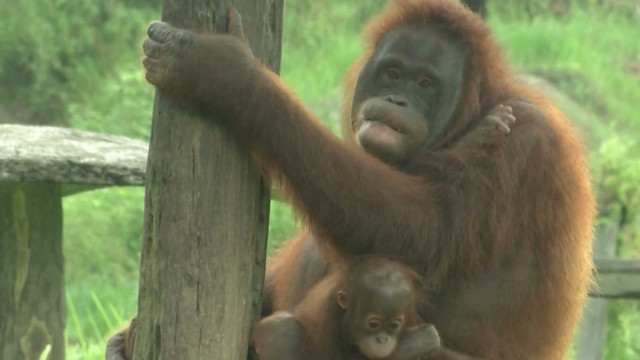Indonesia’s Orangutan populations are struggling.
Illegal logging and excessive forest burning – to produce things like palm oil and mining fields – are mainly to blame.
Now, conservationists are looking for ways to save the charismatic great apes.
CGTN’s Silkina Ahluwalia reports from Borneo.

Jamartin Sihite is CEO of Borneo Orangutan Survival Foundation and he has been an orangutan conservationist for over 30 years. He has seen Indonesia’s pristine jungles all the way from Sumatra to Kalimantan. He says Borneo’s rainforests are now going through a major change.
“Our biggest challenge is that Indonesia’s forests are wanted by many parties. It can be turned into palm oil plantations, mining fields and many more. We are losing forests too quickly. We have to try and stop that,” Sihite said.
Borneo has lost nearly 30 percent of its forests in the past 40 years.
Indonesia is one of the world’s largest greenhouse gas emitters, and most of its pollution comes from deforestation. In Borneo, rainforests are being cut down to make way for industrial plantations. Millions of hectares of land have been burned down in the past decade. It has gotten so severe that environmentalists are already predicting the end of Borneo’s lush greenery.
Orangutans are paying the price for that deforestation as they are being driven away from their natural habitat.
“If we look at the last forest fire in 2015, it was quite fatal because it mainly attacked the orangutan habitat areas. They lost more than 80 percent of their homes. So we are very worried if it happens again because we could lose much more,” Sihite said.
In Borneo alone, the number of orangutans have dropped by 60 percent between 1950 up until now. The species has a high risk of extinction in the wild.
In 2016, the International Union for Conservation of Nature declared orangutans critically endangered.
“Orangutans play an important role in our ecological system. They help to regenerate our forest by their seed-dispersing behavior. So by saving orangutans in the wild, we are saving ourselves in the long run. Humans need clean air and clean water to live. Orangutans help us achieve that,” said Chairul Saleh, the Orangutan Program Coordinator of World Wildlife Fund Indonesia.
Preserving Indonesia’s tropical rainforests has been a top priority for many conservationists in the country. Over the past years, the issue of climate change has been brought onto the international stage and educators like Sihite are determined to continue to protect Indonesia’s incredible biodiversity.
 CGTN America
CGTN America
